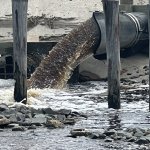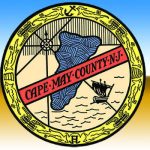CAPE MAY – Cape May City welcomed in 2015 with a holiday reorganization of council before a full house of almost 100 residents. In November voters elected three new council members. This represents a potential new majority on a body that in the past year almost always acted unanimously on policy issues and community initiatives.
The first to be sworn was Jerome “Jerry” Inderwies, Jr. who only recently stepped down from his position as the city’s fire chief and who is the son of former Mayor Jerome Inderwies. The former mayor watched as his son took the oath. Inderwies assumed his seat on the council pushing “fresh ideas, positive attitude and teamwork” as the keys to future success.
Beatrice Pessagno was the next member sworn. She also is the daughter of a former mayor, Frank Gauvry who passed away in 2011 and is largely credited with the initial development of the Washington Street Mall. In her comments, Pessagno recalled sitting in the balcony at City Hall as a 15-year-old watching her father argue for the creation of the now-successful mall. Pessagno also accepted appointment as council member on the Business Improvement District Board.
Then Shane Meier was sworn. Meier, who ran twice previously for council and fell just short of election, found the third time the charm. At 28, Meier, by far the youngest member, brings a different generational perspective to the body. Crediting his mother with instilling in him a strong sense of public service at a young age, Meier served on many civic and community boards as he continued to seek election to council. Meier was also appointed council member on the Planning Board.
Council member Terri Swain, who along with Mayor Edward Mahaney, is a continuing member with two years left in her term, was elected deputy mayor, replacing the outgoing Jack Wichterman in that post. Swain, also a prominent local businessperson, was appointed to the city’s Emergency Management Council.
City Planning
Mahaney delivered the annual State of the City address. He used the opportunity to speak about achievements of the last year and proposals for the future.
Citing what he termed “a comprehensive and systematic sustainability approach for our city over the next two decades,” a major theme of the address was the integration of planning efforts for facilities, capital improvements, finance and budget, and programs and services.
This approach, Mahaney maintains, allows the city to sustain its economic development, a commitment to infrastructure, its excellence in environmental stewardship, and the affordability of the community.
Mahaney created the city’s integrated planning with placing it in good position to compete successfully for grants that relieve the burden on taxpayers. He cited as an example “over $10.2 million in grants and rebates for city initiatives involving needed public improvements, environmental and energy conservation projects.”
For Mahaney the value of integrated planning is clear and he urged the new council to continue the process. He recommended council reorganize and consolidate “the interrelated missions, goals, responsibilities, and membership of the Environmental Commission, Sustainable Jersey Green Team, and the Shade Tree Commission into a centralized and coordinated body entitled the Sustainable Environmental Commission.”
The theme of coordinated planning carried over into Mahaney’s remarks on open space and parks where he noted that through the planning process “the city has now coordinated funding through a grant and the city’s capital fund for upgrades and improvements to Rotary Park.”
Mahaney spoke of the Lafayette Street recreation area efforts and the interest of the city in “acquiring and preserving 78 acres of pristine environmental wetlands in East Cape May as a wildlife sanctuary.”
Water Supply and Hazard Mitigation
Among the initiatives announced in the mayor’s address was the goal of doubling the output for the desalination plant that supplies two thirds of the city’s water and also services Cape May Point, West Cape May, and the U.S. Coast Guard base. Speaking of the plant, Mahaney noted that the “facility has moved Cape May’s status from a water-dependent utility to an independent, regional water supplier.”
The address called for continued actions to maintain the city’s status including a new well and the doubling of the desalination plant capacity.
The aftermath of Superstorm Sandy, the new FEMA maps, and the changing nature of the flood insurance program all present new challenges for the city. Mahaney announced major mitigation initiatives. First, he spoke of a project to elevate and improve the Beach Avenue seawall in East Cape May. The effort would then extend to the Delaware Avenue harbor front. At an expected cost of around $12 million, a combination of federal, state and county funds should mean that the cost to the city will be “very small,” Mahaney said.
Small Business and Budget
Mahaney proposed using funds remaining from a state Small Cities Block Grant to create a revolving loan program for small businesses. With just over $700,000 available, Mahaney hopes the program will help keep the small business-dominated city economy vibrant.
He tied this effort to another initiative to use around $400,000 in affordable housing funds to provide more units that offer affordable alternatives to these small business owners and operators, many of whom find themselves priced out of the city real estate.
Mahaney discussed the city’s finances showing a graphic depiction of the city’s overall $26.5 million budget. Less than two thirds (63 percent) of the overall budget is made up of the current fund. The city’s three utilities, Beach, Tourism, and Water, comprise the remainder. He urged council to continue the slow process of shifting the burden of tourism from the resident and commercial tax base to the “actual participants in tourism-related activities.”
He noted that the city’s utility budgets were all self-sustaining in 2014. Mahaney also spoke with pride of the city’s ability to get its bond rating elevated to AA, the highest possible rating for a municipality of its size.
Returning to his theme of integrated planning and management, Mahaney claimed that the city’s efforts at “of long-range planning, prudent fiscal management, and operational effectiveness” have strategically positioned it for the “sustainability of the necessary array of programs and services that are expected and demanded by our taxpaying public over future years.”
Mahaney only briefly mentioned the controversial effort to change the school funding formula that saddles the city with a third of the costs of the Lower Cape May Regional School District despite having only 67 students in the system.
Whether or not the city continues its efforts at forcing a change through a court case will depend largely on the positions taken by the three new members of council.
Mahaney promised a meeting with the city’s special counsel in January 2015 “to share information and strategies regarding the future course of action on this important issue.”
To read Mahaney’s complete State of the City Address, go to http://goo.gl/3M7xs8.
To contact Vince Conti, email vconti@cmcherald.com.








